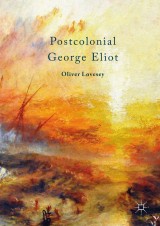Details

Postcolonial George Eliot
|
CHF 65.00 |
|
| Verlag: | Palgrave Macmillan |
| Format: | |
| Veröffentl.: | 17.08.2017 |
| ISBN/EAN: | 9781137332127 |
| Sprache: | englisch |
Dieses eBook enthält ein Wasserzeichen.
Beschreibungen
<p>This book examines the range of the colonial imaginary in Eliot’s works, from the domestic and regional to ancient and speculative colonialisms. It challenges monolithic, hegemonic views of George Eliot — whose novelistic career paralleled the creation of British India — and also dismissals of the postcolonial as ahistorical. It uncovers often-overlooked colonized figures in the novels. It also investigates Victorian Islamophobia in light of Eliot’s impatience with ignorance, intolerance, and xenophobia as well as her interrogation of the make-believe of endings. Drawing on a range of sources from Eugène Bodichon’s Algerian anthropological texts, the Persian journals of John Martyn, and postmodern re-engagements, <i>Postcolonial George Eliot</i> has implications for an understanding of the globalization of English, the decolonization of disciplinarity and periodization, and the roots of present-day conflict in the wider Mediterranean world.</p>
1. Introduction: George Eliot and the Victorian Postcolonial.- 2. Decolonizing Victorian Anthropology (<i>Scenes of Clerical Life </i>and <i>Adam Bede</i>).- 3. George Eliot and Victorian Islamophobia (<i>Felix Holt's </i>Colonial Subject.- 4. <i>Middlemarch</i>'s Colonial Imaginary.- 5. Conclusion: The Leavis Tradition, Educational Assessment, and the Postcolonial Library.- Works Cited.
<p>Oliver Lovesey is Associate Professor of English at the University of British Columbia, Okanagan Campus, Canada. He has authored a number of monographs on George Eliot and Ngũgĩ wa Thiong’o, and edited <i>Victorian Social Activists’ Novels</i>, <i>The Mill on the Floss</i>, <i>Approaches to Teaching the Works of Ngũgĩ</i>, and a <i>Popular Music and Society</i> special issue: 'Popular Music and the Postcolonial'.</p>
This book examines the range of the colonial imaginary in Eliot’s works, from the domestic and regional to ancient and speculative colonialisms. It challenges monolithic, hegemonic views of George Eliot — whose novelistic career paralleled the creation of British India — and also dismissals of the postcolonial as ahistorical. It uncovers often-overlooked colonized figures in the novels. It also investigates Victorian Islamophobia in light of Eliot’s impatience with ignorance, intolerance, and xenophobia as well as her interrogation of the make-believe of endings. Drawing on a range of sources from Eugène Bodichon’s Algerian anthropological texts, the Persian journals of John Martyn, and postmodern re-engagements, <i>Postcolonial George Eliot</i> has implications for an understanding of the globalization of English, the decolonization of disciplinarity and periodization, and the roots of present-day conflict in the wider Mediterranean world.
<p>Challenges conventional views of George Eliot through exploring the range of the colonial imaginary in her work</p><p>Uncovers frequently overlooked colonial figures in her novels and explores Victorian Islamophobia</p><p>Draws on a compelling range of sources, such as Eugene Bodichon's Algerian anthropology texts, to better understand the roots of conflict in our postcolonial present</p><p>Includes supplementary material: sn.pub/extras</p>
Diese Produkte könnten Sie auch interessieren:

American Consumer Culture and its Society: From F. Scott Fitzgerald`s 1920s Modernism to Bret Easton Ellis`1980s Blank Fiction

von: Johannes Malkmes

CHF 64.99
















